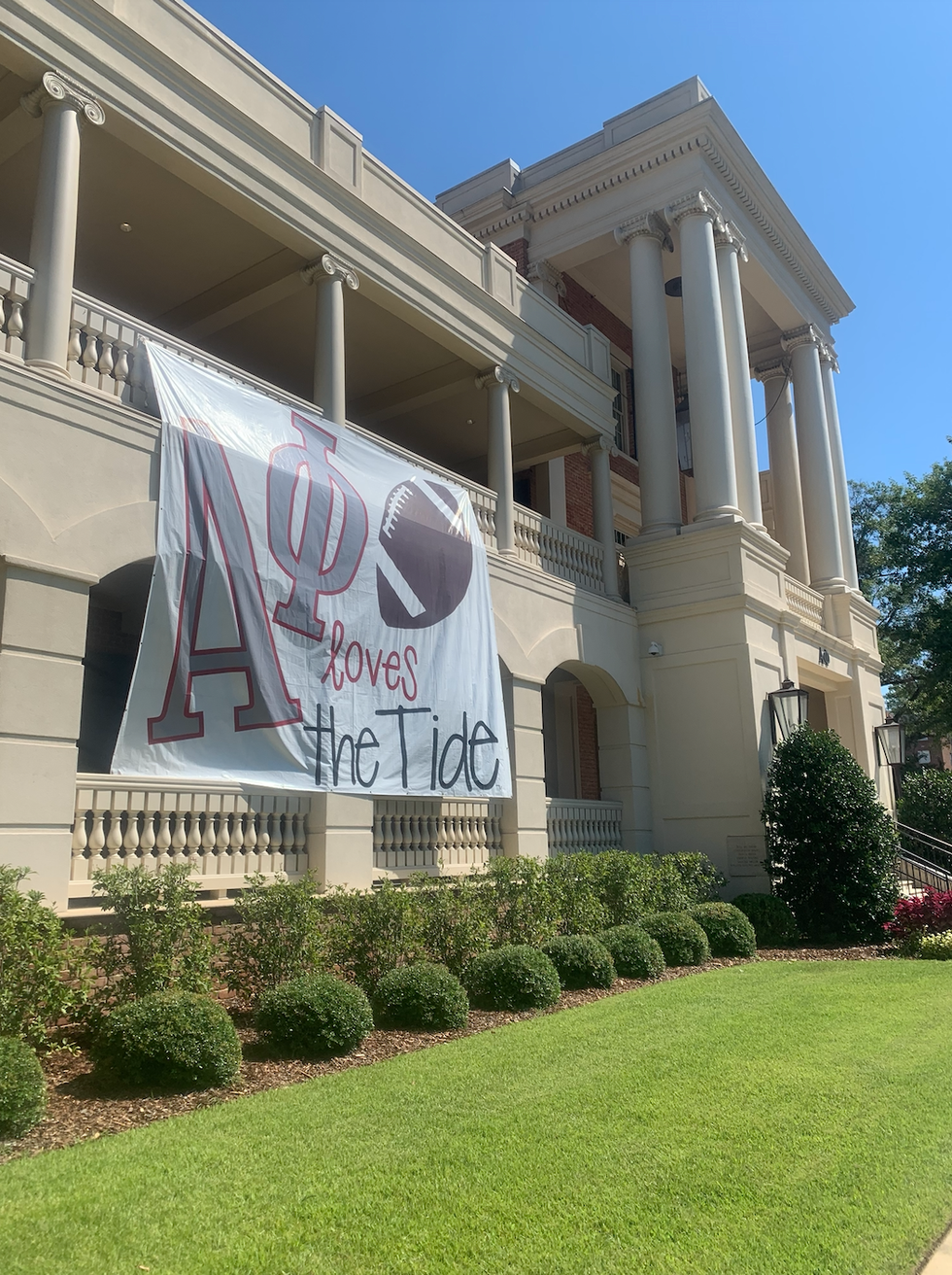
As I’m sure you’re well aware, Max (the baby of HBO Max and Discovery+) just released their highly-anticipated documentary, Bama Rush. Covering the social media phenomenon that is The University of Alabama’s Panhellenic rush, the doc promises a real look into the pledging process at (arguably) the most cutthroat Panhellenic program in the world. I’d like to think I have some insight into this process as a former Alabama sorority girl myself, and let me tell you all of the things the doc got right about this decades-old tradition that has rendered the nation speechless and TikTok obsessed.
For some context – The University of Alabama (UA) is one of 14 SEC (Southeastern Conference) universities, all of which participate in the Southern tradition of panhellenic rush. With nearly 20 panhellenic houses, over 2,000 active members and a slew of multimillion dollar chapter mansions lining the streets of Tuscaloosa, Alabama, it’s no wonder the process is such a spectacle to those outside of the insular community.
Of course, I must note that my 2019 rush experience was certainly different from the 2021 recruitment featured in Bama Rush. After all, TikTok was still in its infancy, the college admissions scandal was still fresh, and there were absolutely no Kylie Jenner x Timothée Chalamet relationship rumors. However, if there’s anything UA does well it’s tradition, so most of my experiences are probably quite similar to those PNMs will encounter this Fall.
Can you sum up sorority culture at UA?
Well, I can certainly try! Like clockwork, every year hundreds of young women flock to UA’s pristine campus (Mind you, this all happens before classes even begin.) under the scorching August sun to test their luck at landing one of the coveted spots in a “top” house – or just any house for that matter. At UA, reputation is everything, so the house you get into matters.
Socially, the houses are divided into a few categories. You have the tier ranking system (top, middle and bottom) alongside the “Old Row” houses, AKA chapters that are deeply rooted in Alabama and/or the South. These Old Row houses typically have a strong Christian demographic, and recruit *almost* exclusively southern PNMs (potential new members). There are strong legacy ties within these houses, and these are the chapters that have a majority impact on the political interface of UA Greek life.
However, at least when I went to UA, Old Row houses are not equivalent to top houses. In fact, the top three houses aren’t a part of that community at all. This holy grail trifecta has a very niche recruiting strategy – they’re looking for the smartest, most attractive women that will contribute academically and socially to their on campus status. These chapters are notoriously hard to get into, as they almost always pre-determine their MC (member class) before the PNMs arrive on campus. (If you rushed at UA – you’ll definitely remember the deluge of active sorority members reaching out via social media before the no-contact period.)

Once PNMs arrive on campus, they begin a week-long journey to finding their “home,” voting through various rounds (Open House, Philanthropy, Sisterhood, Preference Day) via a mutual ranking system. Essentially, as long as you and a house choose each other, you’ll continue onto the next round. Each round is structured around a common theme for the day, with the length of the sessions increasing with every round. (by the end of this process you’ll be able to talk to a brick wall, believe me.) Eventually, PNMs that make it through each round will arrive at Bid Day, thus securing their spots in whatever house of their (kind of) choosing.
There are a plethora of rules PNMs and active members must abide by during this process, from a no-contact order to restrictions on what you can chat about (I was taught the Three Bs: No Boys, Bible or Booze). Oh, and you can’t, under any circumstances, bring any technology into the chapter houses. The moment the door songs begin, if you’re caught with any sort of technology (that’s not necessary to sustaining your health) you are automatically out of the process. No ifs, ands or buts.
And yes, all of these events are highly orchestrated, with each detail meticulously curated (from which active member talks to you to where you stand) over the course of months by a select recruitment committee. Every encounter you have has an underlying meaning, so you truly can’t take anything at face value. (i.e. If you’re seated close to the door, that means you’re last to arrive and first to leave, so that sorority may not be as inclined to add you to their MC.)
Securing a spot in any sorority isn’t guaranteed, let alone one in an Old Row or top house, so I can certainly sympathize with the stressors many of the women featured in the doc shared.
Oh, and this process isn’t free. Not only do you have to go through the lengthy process of submitting your application, resumé, and a several hundred dollar application fee, but you’re expected to dress to the nines every day of rush, no matter the weather or 5 a.m. wakeup call. This is nothing compared to the several thousand dollars you’ll be shelling out to maintain your membership per year, but nevertheless.
I should also mention the longstanding (and very patriarchal) tradition was only desegregated in 2013, literally a decade ago. While many UA chapters claim to be inclusive, out of hundreds of active members there are only a handful of diverse women in each house. The Alabama Panhellenic Association has a long way to go in ensuring a safe environment for minorities within their chapters, and I look forward to seeing how the community becomes more inclusive in the future.
Additionally, attractiveness plays a far-too-large role in the rushing process. Even though many houses claim that they do not base their decisions off of “looks,” it’s clear that isn’t true. Many women feel pressured to fit into the “Southern” model of beauty – thin, blonde hair, blue eyes and tan – and will go to extreme lengths to make the cut. I can certainly sympathize with these women, having felt the weight of these standards myself.
Who does "Bama Rush" follow?

The documentary follows four young women as they get accepted to UA and embark on the rush process. The PNMs featured are Alabama natives Hailey Holliday and Makalya Miller, and out-of-state students Shelby Rose and Isabelle Eacrett.
Where are the "Bama Rush" girls now?
Rose went Phi Mu, and is currently majoring in public relations with a minor in digital content engagement.
“I love the University of Alabama. It has given me so much,” she said in a social media post on TikTok. “If I didn’t rush at the University of Alabama, I wouldn’t have stayed through the first semester, because the girls I met have given so much to me…I have nothing but positive things to say about campus and the sororities.”
Eacrett receives a bid from Alpha Delta Pi. She has the iconic tagline, “I’m nervited -- which is like, nervous and excited,” in the doc.
Both Miller and Holliday left the rush process early.
Were any of the women in "Bama Rush" penalized by their sororities?
It’s still unclear whether any participants were punished for working with HBO, however UA condemned rumors about secret filming during rush week. These rumors were, of course, later confirmed when the documentary project was announced.
“The University is aware of reports that outside parties have facilitated unauthorized recordings of our students involved in Panhellenic recruitment,” Shane Dorrill, a university spokesman, wrote in an email to AL.com. “The University unequivocally does not condone surreptitious filming or recording of students, some of whom are minors, without their consent. The University has not authorized any third-party entity to film, record, or document any recruitment activities and does not allow media inside occupied buildings such as residence halls and sorority houses.”
“Further, it has been repeatedly communicated that Alabama Panhellenic Association recruitment rules prohibit potential new members from filming or recording inside any chapter houses,” he added. “To be clear, the University is not involved with this production and finds these reported activities to be deplorable, especially when targeting recent high school graduates.”
The Alabama Panhellenic Association is aware of the documentary, but has declined commenting to various news sites on participants’ comments or questions about filming.
What does Bama Rush get right?

1. Alabama is the Greek life standard.
“I remember when we were going through recruitment at Georgia, we would all be looking at what Alabama was doing,” says Rush Consultant Sloan Anderson. “Yeah, they’re just the trend-setters. I think that’s why so many out of state decide to go to the University of Alabama and rush. It’s just this beast, because Greek life is everything at Alabama.”
2. Rushing can be very, very stressful.
I truly cannot emphasize enough the pressure many women face throughout the rush process. Many Southern PNMs have spent their entire lives hearing their moms and grandmothers recount their sorority experiences alongside sorority-sisters-turned-lifelong-friends, so the pressure to join the right house is monumental. So Miller and Eacrett seeing Rush Consultants is shockingly standard for many of these women, and IMO demonstrates the utter importance of this tradition.
3. It’s a social hierarchy.
“Rush is a social stratification ritual, bar-none,” says Southern Beauty: Race, Ritual, and Memory in the Modern South author Elizabeth Boyd, who also visited UA to observe sorority rush parties. “Stratification in the sense of organizing people and groups of people into tiers of power, of status, or prestige. It’s a proving ground of competitive femininity, and the contemporary performance of the Southern belle.”
4. Sororities are ranked. And yes – rank matters.
“I think the competition mostly comes from the rankings of sororities – trying to get into one of those top or middle-tier houses and not getting into a bottom house,” says Pi Beta Phi active member Gracie O’Connor. “I think a lot of the times people like to rank – and by people, I usually mean fraternity boys or boys in general. I feel like they’re like, ‘Oh, this house has the hottest girls, so they’re a top house. These freshman are the hottest freshmen, so they’re going to be considered a top house.’”
Anderson agrees with O’Connor on fraternity influence, saying, “they have a social calendar, and they get to mix with certain sororities, but it’s only a limited amount. And the fraternities want to be mixing with the hottest sororities, of course, because they’re 20-year-old males. So that’s kind of where the ranking system comes from. They want to make sure the girls who are wearing their letters are up to their standards.”
Current Sigma Kappa member Rian Preston chimed in, sharing her experience with this hierarchical system. “The hierarchy of sororities that exist here really determines how your experience in the Greek system is going to be. There are a lot of things that you’re entitled to when you’re in a top-tier sorority. You’re entitled to test banks that are going to help you on your exams. You’re entitled to people in your sorority that have better connections, whether their parents are richer or more connected. You’re entitled to a male gaze that might be a little more beneficial to you. So being in a ‘bottom-tier’ sorority, I have to understand that at some point, there’s nothing I can do to change institutionalized rankings.”

5. There are tons of odd rules.
I touched on this above, but I’m glad it was brought up in the doc. You can’t drink in your letters, bring alcohol into your sorority house, etc. Some stricter rules were shared as well, though I never dealt with those myself. For instance, Hailey shares a “no wet hair” on the first floor of the house rule, and active Gamma Phi Beta member Leah Nelson says a friend told her about one house’s rule that said women could not leave their dorm “unless they had two out of three done, which was either you had to have your hair done, makeup done or outfit on. All it takes is one person to know what chapter you’re in and to reach out to somebody and you can be in trouble the next day.”
6. The Five Bs
I was taught three, but now the Five Bs are: Boys, Bible, Booze, Bucks, and Biden (AKA politics). It’s a huge no-no to initiate any conversation relating to these, but if active members bring it up then it’s okay to engage.
7. Attractiveness plays a role, and many women suffer because of it.
It’s not everything, but it is important. Especially if you don’t have strong grades or many sorority connections, you can make up for any shortcomings if you’re conventionally attractive.
“I just have this image in my head that I need to be, like, tiny,” Miller tells her friends. “I look at myself, I see myself as fat. I know you guys say I’m not, but I see myself as that, and I can’t help it.”
8. Racism is far too normal on UA’s campus.
While UA does have historically Black NPHC (National Pan-Hellenic Council) chapters, the Panhellenic and IFC (Interfraternity Council) associations are incredibly white. As I mentioned before, UA Greek life was only desegregated a decade ago (two decades after the first Black women received a bid from a Panhellenic sorority), so you can imagine how much racism still goes on within the Greek life system and on campus.
“Everyone here thinks I’m everything but Black,” says Miller, who is mixed race. “Like I’m white and Black. They think I’m everything.” She said one guy “swore that I was just white and just really, really tan. If I’m too white, I’m whitewashed, but if I act too Black, then I’m not white enough. Like, what am I supposed to be because I’m both races? Why can’t I just act myself? I’m not acting a race -- you can’t act a race. I’m just split in two.”
Rian says that while she hasn’t experienced any “overt racism” at UA, she has been subjected to micro-aggressions. “I have come to know and love the people in my sorority and to know that they wouldn’t have loved or trusted me 40-50 years ago, it makes me feel upset,” Preston says. “And I honestly for my own self-preservation don’t really like to think about it.”
9. “The Machine” is real.
Otherwise known as Theta Nu Epsilon, the Machine is a highly secretive group of fraternities and sororities designed to influence campus politics at the University of Alabama.
“They control everything on this campus. So if there’s an election, the Machine is rigging it. If there’s a homecoming queen, it’s the Machine candidate,” Garrett, an Alabama SGA associate justice, shares.
Alex Smith, a Phi Mu alum and former Machine student senator, gives a rare inside look at Machine operations. “At the end of the day, something just felt really dark and ugly about it,” she said. In 2015, Smith wrote a guest column for UA’s student-run newspaper The Crimson White titled “Why I’m leaving the Machine,” exposing her involvement and some of the organization’s activities. In the doc, PNMs and sorority members refused to acknowledge its existence.
9. Rushing costs money, honey.
A year as a new member can run you nearly $10k, which includes chapter dues, a meal plan and house fees. If you live in the house, it can get even more expensive.
10. Beware of Standards.
The infamous standards board (which has since become synonymous with the patronizing “hey girly” text) have plagued everyone’s general understanding of the dos and don'ts of sorority life. But these judicial groups are very real – and very much a game of favoritism – and one too many violations will get you kicked out of your sorority for good.
11. You definitely don’t want to get blacklisted.
Both frats and srats have blacklists – and the tiniest misstep can secure your spot on one. Hailey dealt with this firsthand. She originally rushed in August of 2021 and chose a sorority house, but after wearing a different sorority sticker she was dropped. As she prepares to rush again, she overhears sorority girls talking about her blacklisted status. She ultimately decides not to rush. After all – sororities are all about branding, so how you present yourself is imperative.
What did the doc miss?
1. “Rank” is determined by more than just frat boys.
It’s a culmination of – yes, fraternity influence – but also Southern ties, on campus reputation, high GPAs, and so much more.
2. You’re lucky to get a “chosen family.”
Sororities are branded as this welcoming sisterhood – a place where you’ll meet your future bridesmaids and besties for life. Unfortunately, this isn’t all that true for many members.You may meet a couple of friends, but ultimately most members end up “dropping” their sorority come junior year.
3. Fraternities are a huge issue.
Fraternities have an unnecessarily large role in sorority life, and TBH they need to be taken down a few notches. While reputation is everything for sororities – to the point where members can get kicked out for posting a “scandalous” picture, their male counterparts get away with anything and everything.
Certain frats were known for drugging women as part of an initiation ritual, or for sexually assaulting women regularly. Seriously. One house is known for sexually assaulting women, and it’s advised not to go there. Despite this – these men play a massive role in which sororities rank well and “deserve” parties with them, and which do not.
4. Hazing happens but it’s much more common in frats.
I never experienced hazing, nor did anyone I know. In conversations with frat members, though, their hazing rituals were next-level and should be scrutinized more thoroughly.
5. Sororities can be an incredible place of community.
There are plenty of issues within UA Panhellenic, but ultimately these organizations can lead to lifelong friendships, incredible memories and massive charitable contributions. Greek life is Alabama, and Alabama is Greek life. From football games to date parties, sisterhood events and more, sorority life is amazing for so many women. Experiencing this firsthand is a once-in-a-lifetime opportunity, and one that I will certainly never forget.Where can I watch Bama Rush?
Bama Rush is streaming now exclusively on Max.
I must admit – writing this has been quite therapeutic for my ex-panhellenic member’s soul. From a first-hand perspective, I truly enjoyed watching Bama Rush and seeing the many truths about the process brought out of secrecy, and highly recommend it to anyone with the slightest glimmer of curiosity.
Stay updated on all the latest pop culture news with Brit + Co.
Header image courtesy of Max
0 Commentaires